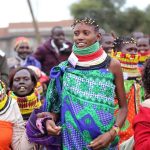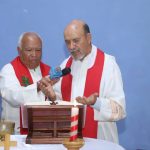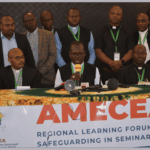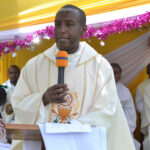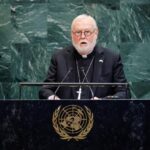Kigali, Rwanda
As the African Church continues to engage with evolving cultural realities, Catholic Bishops meeting at the 20th Plenary Assembly of the Symposium of Episcopal Conferences of Africa and Madagascar (SECAM) have approved six pastoral guidelines to assist clergy and pastoral agents in accompanying individuals in polygamous unions – while faithfully upholding the Church’s teaching on monogamous marriage.
The proposals were presented by Sr. Esther Lucas Jose Maria, a Mozambican theologian from the Daughters of Charity of St. Vincent de Paul. Her presentation responded to the Synod on Synodality’s call for deeper theological and pastoral reflection on the issue of polygamy in Africa. The document, prepared by a team of theologians, was also reviewed by the Dicastery for the Doctrine of the Faith.
These guidelines emerged from one of the Assembly’s four key agenda items: a pastoral reflection on cultural realities, particularly polygamy. with a particular focus on polygamous unions.
Six Pastoral Proposals
- Welcoming Persons in Polygamous Situations
Those in polygamous unions should be welcomed into the Church, invited to participate in liturgical life and hear the Word of God – without being forced to change their marital status - Fostering Community Inclusion
Children and spouses in polygamous households should be integrated into the Church community. The document highlights that salvation is not tied solely to sacraments, but to the acceptance of Christ and ongoing spiritual formation - Support for Widows Affected by Polygamy
The bishops called for pastoral attention to widows – many caught in cultural practices such as wife inheritance – and urged accompaniment that enables them to live with dignity and independence - Conversion and Conscience – Centered Discernment
Rather than demanding immediate regularization, the Church should accompany individuals with respect for conscience formation, guiding them gently toward conversion and personal growth - Redefining Fecundity as Spiritual Fruitfulness
The bishops promote a broader understanding of fecundity – emphasizing charity, service, and spiritual generosity over biological parenthood alone - Family Apostolate and Targeted Catechesis
The document calls for catechetical outreach to families in polygamous situations, with particular support for those unable to access sacraments, including first wives or children born into such unions.
Dialogue, Openness & Ongoing Reflection
Sr. Esther emphasized that the proposals reflect a beginning, not a conclusion. They are intended to evolve through deeper reflection and continuous dialogue, always rooted in pastoral sensitivity and doctrinal fidelity.
Archbishop Andrew Nkea Fuanya of Bamenda clarified that polygamy was not introduced for endorsement at the Synod, but rather as a pastoral challenge confronting Christian marriage in African contexts. He highlighted the approach of listening, proximity and accompaniment, encouraging individuals to follow their consciences in light of the Gospel.
Context & Approval Process
- The pastoral proposals arose following the October 2023 Synod, which tasked SECAM with exploring ways to accompany those in polygamous unions, whether they are baptized or seeking baptism.
- Cardinal Fridolin Ambongo, President of SECAM, outlined a four-phase process culminating in the draft’s presentation and eventual review by bishops and theologians in July 2025, before submission to the Dicastery for the Doctrine of the Faith for final orientations.
Conclusion
This SECAM document uniquely blends doctrinal fidelity with pastoral engagement. While clearly upholding that marriage in the Catholic Church is strictly monogamous, it also affirms that the Church cannot shut the door on those living in complex cultural realities such as polygamy. This pastoral openness, rooted in listening and accompaniment, aims to bring people onto a path of conversion and participation in the Christian community.




